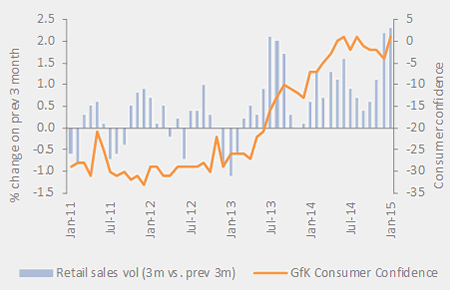Retail sales momentum continues into 2015
Retail sales growth maintained strong underlying momentum in January with sales up by 2.6% on the previous year (values, non-seasonally adjusted). The underlying pattern in the rolling three-month on three-month (chart 1) movement in the quantity bought showed continued growth for the 23rd consecutive month, increasing by 2.3%. This was the strongest growth since April 2002 when sales were up 2.5% and was the longest period of sustained growth since November 2007 when there were 25 periods of consecutive growth.Online sales fell by 0.2% in January 2015 compared with December 2014 and accounted for 11.6% of all retail sales in January 2015. Online sales increased by 12.0% compared with January 2014.We remain positive on the outlook for the retail sector for 2015 as the backdrop of low levels of inflation and rising real wages support higher levels of household disposable income. Inflation fell to an all-time low of 0.3% in January, driven by falling prices in transport, food and energy. According to the ONS, average store prices fell by 3.1% in January 2015, year-on-year. This was the largest annual fall since records began in 1997. The largest contribution once again came from petrol stations which fell by 15.1%, the largest year-on-year fall in this store type on record. Importantly, these components of the consumer basket are relatively income insensitive, hence, as energy prices fall, households’ energy consumption is unlikely to alter significantly. Therefore, deflation in areas of non-discretionary spending (transport, energy and food) is likely to have a material impact on consumer spending in more income sensitive areas like consumer electricals, homewares and some big-ticket purchases. Admittedly, some households may decide to increase their levels of saving but with consumer confidence near pre-crisis levels we believe that households will be more inclined to spend. After all, the labour market continues to improve and the unemployment rate is at a near seven-year low. Consumers are more confident about job security and as the market tightens, there is scope for pay rises to gather pace. The Bank of England forecasts that wages will reach annual growth of 3.5% by the end of the year. Although the prospect of deflation could encourage firms to offer lower pay settlements, after five years of falling real wages, we believe that lower costs faced by businesses will be passed on to staff in the form of higher wages. Indeed, survey evidence suggests that expectations of wage growth remains robust and inflationary expectations remain anchored at levels consistent with a gradual rise in prices by the second half of the year.Chart 1: Retail Sales Volumes (3m on 3m) and consumer confidence

Source: ONS, GfKWe believe “Goldilocks” conditions of low inflation, robust wage growth, improving consumer confidence and stronger macroeconomic fundamentals will underpin consumer spending to rise at an annual rate of c.3.0-3.5% this year. The latest data for consumer confidence showed a notable rise in January 2015 for consumers’ appetite to make major purchases and expectations of personal finances over the next 12 months. This bodes well for spending in the first quarter of 2015. The trajectory of consumer confidence can act as a useful forward looking indicator for the path of consumer spending (chart 1).We suspect that household goods, in particular, will continue to benefit from stronger underlying conditions for consumers. Although the housing market slowed towards the end of 2014, stamp duty reforms, record low mortgage rates and increasing supply of credit will revitalise house moves in the coming months. Furniture, flooring and household goods are likely to be major benefactors. More competitive personal loan rates will spur on demand for big-ticket items such as kitchens and bathrooms. However, the global backdrop has become choppier in recent months with emerging market economies having deteriorated, the euro area remaining weak and the geopolitical tensions in Russia, Ukraine and the Middle East compounding uncertainty. The outcome of vital talks with Greece is also a key factor in determining confidence.Closer to home, the General election in May and the prospect of earlier than anticipated interest rate rises also make forecasts trickier.
Back to Retail Economic News